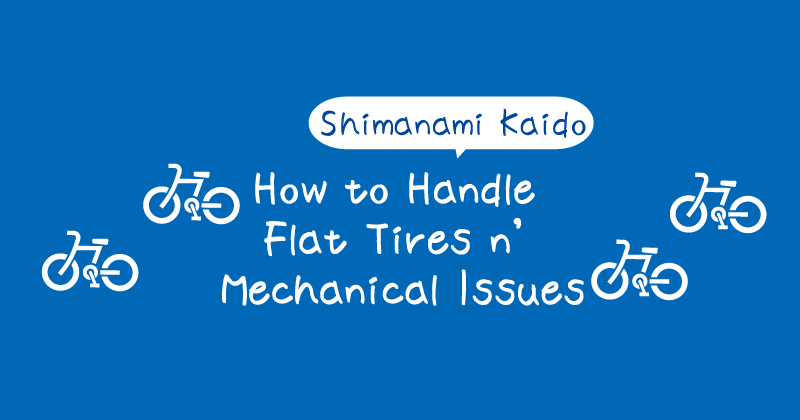
Worried about bike trouble while cycling the Shimanami Kaido? This guide covers repair services, emergency contacts, and tools along the route.
Hello, I am Kawai, a cyclist living on the Shimanami Kaido. This is a personal website where I have gathered information for travel planning. It would be great if you could visit one of the most famous cycling routes in Japan.
What is the Shimanami Kaido?
A well-maintained cycling route
The Shimanami Kaido is a cycling route connecting the islands between Ehime and Hiroshima prefectures. This cycling adventure takes you across a series of islands in the Seto Inland Sea, letting you experience a tranquil ride through peaceful fishing and farming villages, surrounded by beautiful coastal scenery.
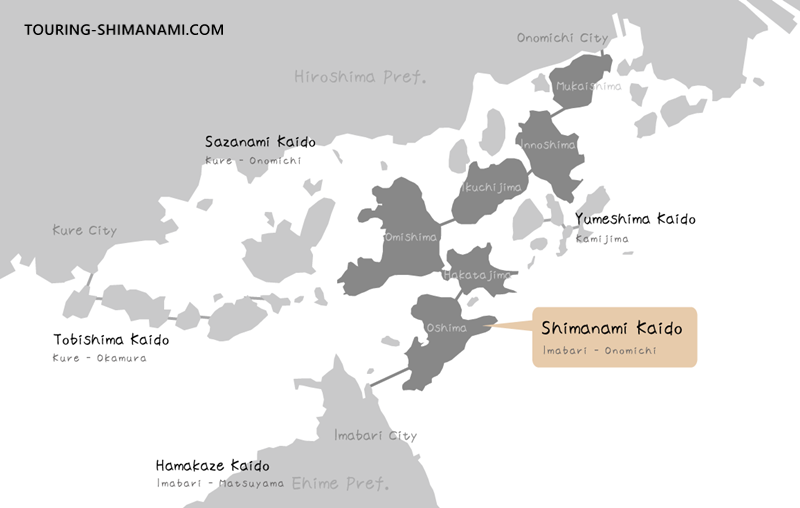
The Shimanami Kaido has been designated a National Cycling Route and continues to be developed as a world-class ride. It is especially popular among beginners taking their first cycling trip. For example, public bike rental systems on both the Imabari and Onomichi sides are connected, and terminals are located on each island. This allows you to return your rental bike at various locations, including Onomichi, Imabari, or anywhere in between—perfect for planning flexible routes.
- Bike trouble on the Shimanami Kaido
- Repair and roadside assistance services
- Tips for beginners to prevent common issues
Support systems for first-time riders
![[Photo] Flat tire on the Shimanami Kaido: Cycling along the Blue Line](https://touring-shimanami.com/wp-content/uploads/2023/08/panku-shimanamikaido.jpg)
The recommended route along the Shimanami Kaido features a “Blue Line” that acts as a guide toward destinations like Imabari and Onomichi. You’ll also find maps at key intersections to help keep you on track, even if it’s your first time on the route. Additionally, you’ll find “Cycle Oases” along the route—rest stops equipped with toilets, air pumps, and basic tools.
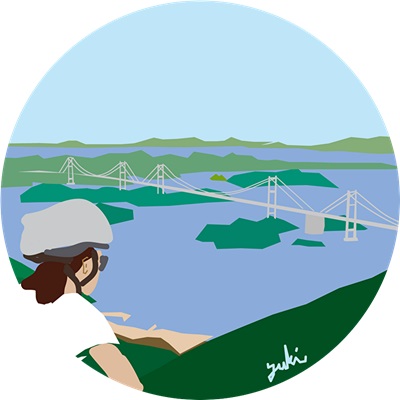
This page introduces how to deal with common bike troubles like flat tires during your cycling trip.
AD (Google AdSense)
What to do if you get a flat tire
Flat tire on the Shimanami Kaido! What should I do…?
![[Photo] Flat tire on the Shimanami Kaido: What to do when you have bike trouble](https://touring-shimanami.com/wp-content/uploads/2023/02/cycling-tools.jpg)
One of the inevitable troubles during a cycling trip is a flat tire. For first-time cyclists, these kinds of mechanical problems can be the biggest worry. While there are few bike shops on the islands of the Shimanami Kaido, various support systems are in place to assist you. Just knowing about them beforehand can greatly ease your concerns.
How to solve the problem
Sometimes the problem is minor and can be quickly solved by asking passing cyclists for help. I created a simple flowchart outlining possible actions when you get a flat tire on the Shimanami Kaido.
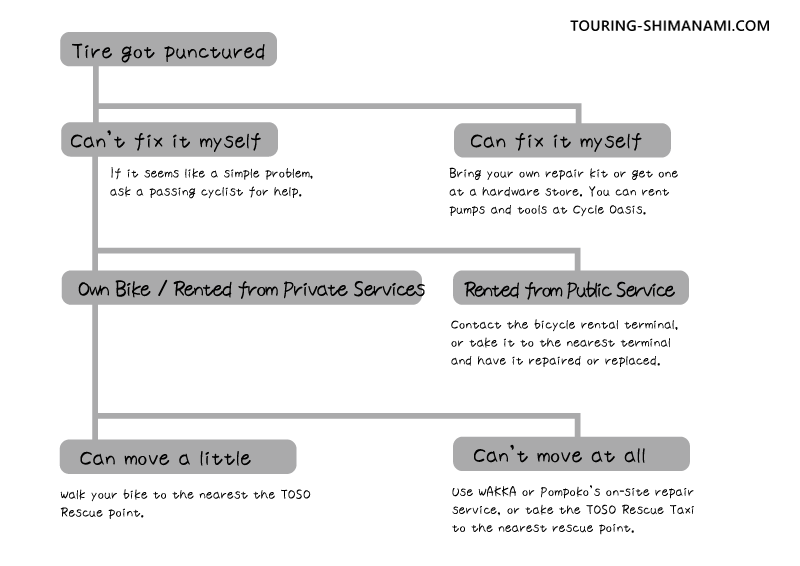
If you are using a rental bike, first contact the rental operator. From April 1, 2022, the operation of public rental bike terminals was transferred to “Shimanami Japan.” Both the Hiroshima and Ehime side rental terminals are now centrally managed and operated by Shimanami Japan.
| Reservation Desk | Shimanami Japan |
|---|---|
| Address | 3rd Floor, Imabari Civic Hall, 1-4-1 Bekku-cho, Imabari City |
| Phone Number | 0848-22-3911 |
| Website | Official Website (external link) |
If you are near a rental bike terminal, you may be able to get repairs done there or exchange your bike for another.
![[Photo] Flat tire on the Shimanami Kaido: The Shimanami Cycle Saver vehicle at Sunrise Itoyama](https://touring-shimanami.com/wp-content/uploads/2022/01/shimanami-cycle-saver.jpg)
The central rental bike terminal “Sunrise Itoyama” offers a service called “Shimanami Cycle Saver” which operates only on weekends and holidays within the Oshima, Hakatajima, and Omishima areas. This paid roadside assistance provides emergency tube sales and replacements, brake adjustments, and other minor repairs on site.
| Shimanami Cycle Saver | |
|---|---|
| Contact | Omishima Rental Bike Terminal |
| Phone Number | 0897-87-3855 |
| Hours of Operation | Weekends & Holidays 10:00–17:00 |
AD (Google AdSense)
Repair and on-site repair services
When cycling on your own bike or a private rental along the Shimanami Kaido, if you encounter troubles like flat tires, you can use services such as the “Shimanami Toso Rescue” or private on-site repair support. These services are generally paid. We have marked rescue points and private repair service providers on a Google My Map.
Shimanami Toso Rescue
“Shimanami Toso Rescue” is a repair support system started in 2012 by local bike shops, auto repair shops, and gas stations who volunteer their services. By bringing your bike with a flat tire or other issues to a rescue point, they will provide repairs within their ability.

Since the repair capabilities vary by rescue point, contact the nearest one first when you experience a flat tire or other trouble. After consulting by phone, you generally push your bike to the rescue point yourself. If it’s difficult to move your bike by yourself, there is also a “Rescue Taxi” service provided by local taxi companies to transport you and your bike.
Private on-site repair services
![[Photo] Flat tire on the Shimanami Kaido: Private on-site repair services by WAKKA and Oyado Ponpoko](https://touring-shimanami.com/wp-content/uploads/2022/01/minkan-rescue-shimanamikaido.jpg)
The multi-purpose facility “WAKKA” on Omishima Island offers comprehensive cycling support including bike taxis and on-site repairs. They provide emergency fixes for flat tires, chain issues, brake adjustments, and gear tuning for a fee based on the island and parts used.
Also, the owner of the lodging Oyado Ponpoko on Oshima Island is engaged in the Shimanami Kaido Cycle Rescue. This is a paid service offering on-site emergency repairs and bike transport, with fees differing depending on whether travel is within or outside the island, as well as the type of repair needed.
| WAKKA | Oyado Ponpoko | |
|---|---|---|
| Address | 6691-1 Iguchi, Kamiura-cho, Imabari City | 1252-1 Fukuda, Yoshiumi-cho, Imabari City |
| Phone Number | 0897-72-8705 | 0897-72-8808 (or 090-3626-7641) |
| Business Hours | 9:00–18:00, Closed Tuesdays | Irregular |
AD (Google AdSense)
Repair It Yourself
If you feel comfortable repairing a flat tire yourself, it’s wise to bring a puncture repair kit including patches and rubber glue. Air pumps and tools can be borrowed at over 100 locations of the Cycle Oasis along the Shimanami Kaido. Most islands also have home improvement stores—we call such stores “Home Center”—where you might purchase repair kits locally.
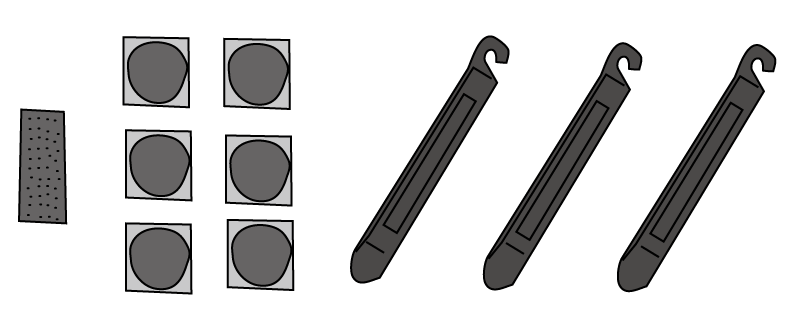
There are two main types of patches for repairing holes in bicycle tubes: “easy patches” that don’t require rubber cement, and the traditional type that does. It’s a good idea to carry a repair kit that includes tire levers for removing the tire. As for inflating your tires, along the Shimanami Kaido you’ll find air pumps available at Cycle Oases. These pumps are compatible with various types of valves, so feel free to make use of them during your ride.
“Home Center” in the islands
*Home improvement stores and DIY stores are called “home center” in Japan.
| Area | Home Center | Address | Phone Number |
|---|---|---|---|
| Imabari | DCM Daiki Chikami Store | 5-4-45 Daishinden-cho, Imabari City | 0898-25-2345 |
| Oshima | Komeri Hard & Green Yoshiumi Store | 84-1 Nie, Yoshiumi-cho, Imabari City | 0897-74-0301 |
| Hakatajima | Konan Homestock Hakata Store | 1369 Kanaura Ko, Hakata-cho, Imabari City | 0897-74-2170 |
| Omishima | Konan Homestock Omishima Store | 5347 Miyaura, Omishima-cho, Imabari City | 0897-74-0573 |
| Ikuchijima | Komeri Hard & Green Setoda Store | 405-4 Nakano, Setoda-cho, Onomichi City | 0845-26-4165 |
| Innoshima | Yuho Innoshima Store | 2517-1 Taguma-cho, Onomichi City | 0845-22-8800 |
| Innoshima | Juntendo Nakasho Store | 4673 Nakasho-cho, Onomichi City | 0845-26-2005 |
| Mukaishima | Yuho Mukaishima Store | 1008-1 Kuramoto-dani, Mukaihigashi-cho, Onomichi City | 0848-20-6577 |
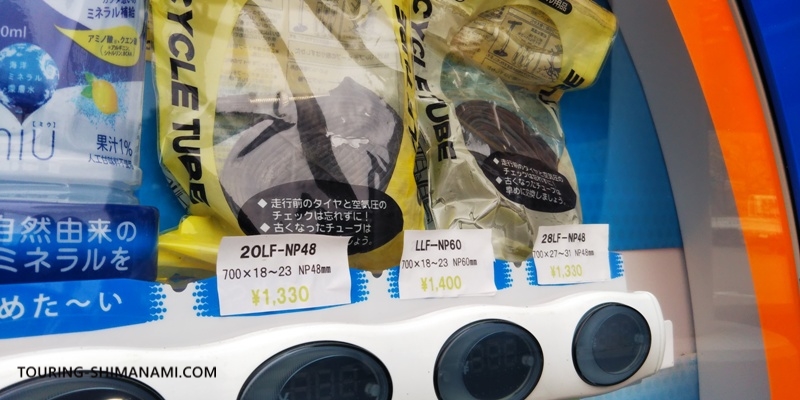
Also, at three locations—Sunrise Itoyama, the roadside station “Yoshiumi Ikiiki-kan,” and the roadside station “Tatara Shimanami Park”—vending machines selling drinks also offer road bike tire tubes. If you need a 700C size tube, you might be able to get one from these vending machines.
- Contact the rental bicycle terminal
- Bring the bike to a Shimanami Island Rescue point
- Call a private on-site repair service
Maps you should get in advance
“CycloTourisme Shimanami,” which has been active in cycle tourism and regional promotion for nearly 20 years along the Shimanami Kaido, publishes guidebooks and maps. The map is also available in English and is extremely popular as it is the most detailed cycling-specific map in this region.
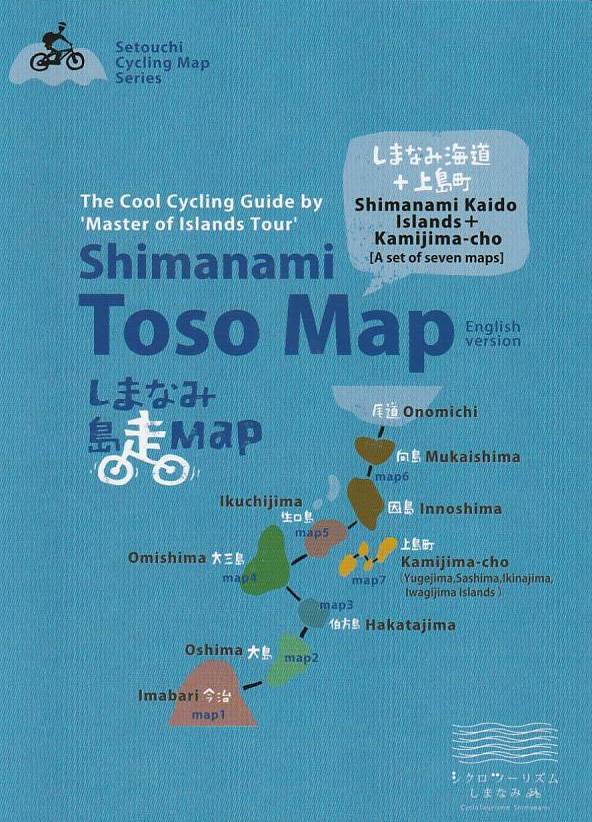
This product comes with a set of seven maps, each with a fairly detailed map for each island. I believe that getting your hands on this map will change your experience here. It can be purchased on Amazon.co.jp, and you can also buy it locally at Guesthouse CYCLONOIE in front of Imabari Station.
Preventing troubles

Even with careful prevention, flat tires and other troubles can happen while cycling. When renting a bike, it’s best to check the tire air pressure, brakes, and gear shifting before you start. While rental staff generally check these points, since many bikes are rented out, it’s recommended to double-check yourself.
- Inflate tires to the proper pressure before riding
- Check brakes and gear shifting
- Wear your helmet properly
Inflate tires properly to prevent flats
By maintaining the correct tire pressure, you can reduce the risk of getting a flat tire.
Common causes of flat tires include:
Daiwa Cycle
・Aging or deterioration of tires and tubes
・Pinch flats caused by insufficient air pressure
・Punctures from foreign objects
All rental bicycle terminals on the Shimanami Kaido have air pumps available, so be sure to check the air pressure before you start riding.
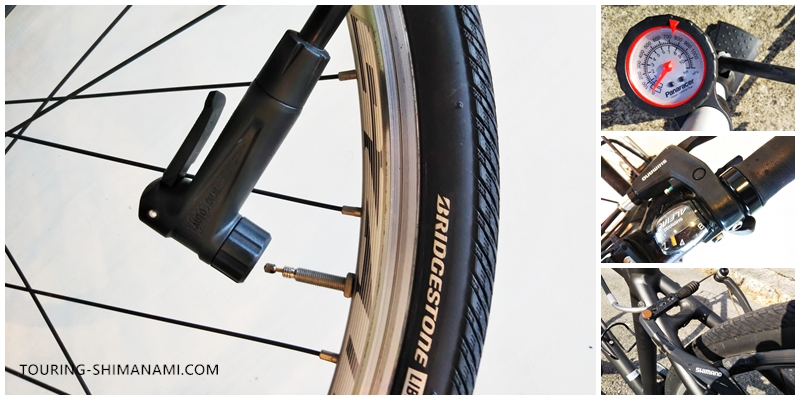
Many modern air pumps come with pressure gauges, so inflating your tires to the pressure printed on the tire sidewall will be perfect. If you find it difficult to pump yourself, ask the rental staff to help.
Check for strange noises, catches, or any discomfort
Apart from tire pressure, focus on checking whether the front and rear wheels spin smoothly, the brakes work firmly, and the gears shift properly. These checks help prevent mechanical troubles before they happen.
Always Wear a Helmet
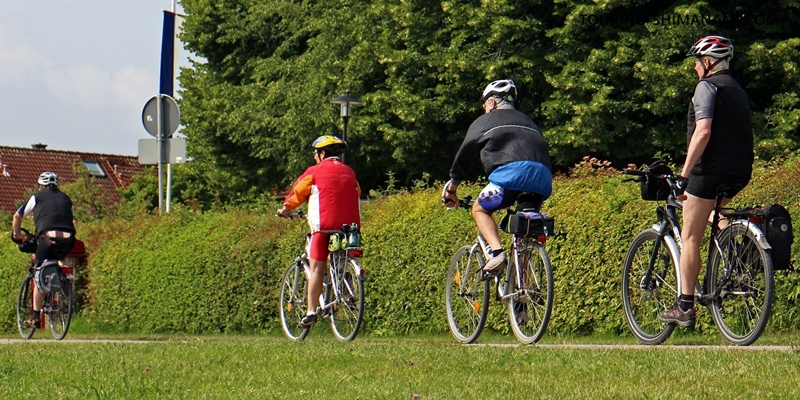
Rental bicycles always come with a helmet. Many accidents have been reported where “if only they had been wearing a helmet…” Wearing a helmet drastically reduces the fatality rate in accidents. Always wear your helmet. The “Ehime Prefecture Ordinance for the Promotion of Safe Bicycle Use” also requires helmet use. By the way, Ehime has the highest helmet-wearing rate in Japan.
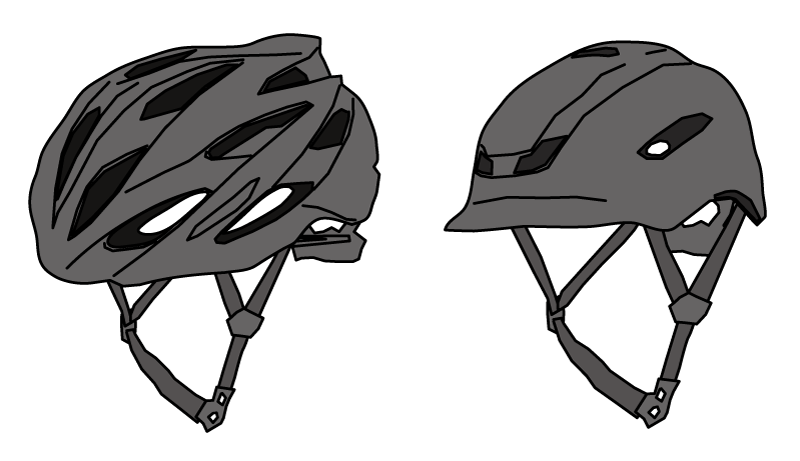
Bicycle helmets have a correct front and back side, so be sure to check before wearing. Adjust the chin strap so there is about two fingers’ width of space vertically, comfortable but secure. Most helmets have an adjustable dial at the back to perfectly fit your head size.
Worried about your hair?
Wearing a cycling helmet directly on your head can mess up your hairstyle due to its shape and pressure points. But of course, you’ll want to take off your helmet when entering shops or having a meal. That’s why we recommend wearing a cycling cap underneath your helmet. It helps protect your hair, and some come with a small brim to shield your eyes from the sun. It’s also a great option if you feel uncomfortable wearing a rental helmet directly on your head.
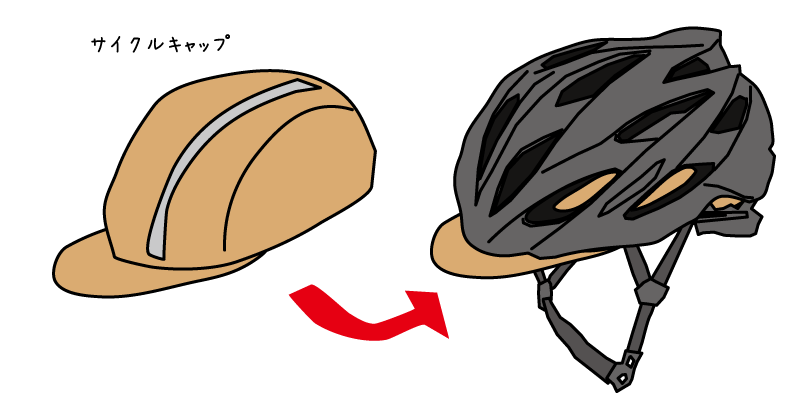
Note: regular baseball caps usually have a button or bump on top, which makes them difficult to wear under a helmet. Cycling caps, on the other hand, are specially designed to be worn with helmets and now come in a variety of fun styles to match your outfit!
Examples of cycling accidents
Knowing common accident patterns that often happen when riding a sports bike for the first time or on an unfamiliar bike can help you enjoy safer cycling. Based on personal experience on the Shimanami Kaido, I’ve summarized some fall patterns I’d like to share with beginner cycling tourists.
On dedicated paths on bridges or general roads
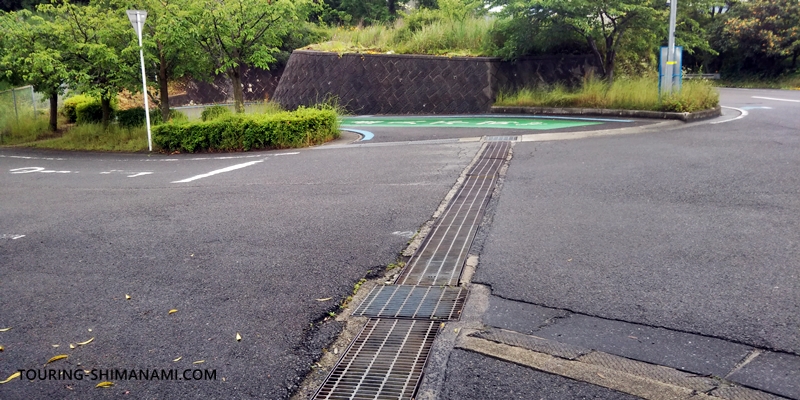
・Collisions due to riding the wrong way or side-by-side riding
→ Many paths on the Shimanami Kaido are narrow. Ride single file on the left side.
・Collisions with pedestrians or motorized bikes
→ Some paths are shared with pedestrians and motorized bikes. Always prioritize pedestrians and watch out for motorbikes.
・Slips on manhole covers, metal grids, or painted lines
→ These surfaces are especially slippery when wet. Avoid riding on them whenever possible.
・Collisions between bicycles due to sudden braking
→ Keep distance in a single file line. When stopping, communicate by saying “Stopping!” to those behind you.
・Falls caused by distracted riding
→ The beautiful scenery may distract you, but avoid riding while looking aside. Stop in a safe spot to enjoy the view.
On downhill slopes from bridges or mountain passes
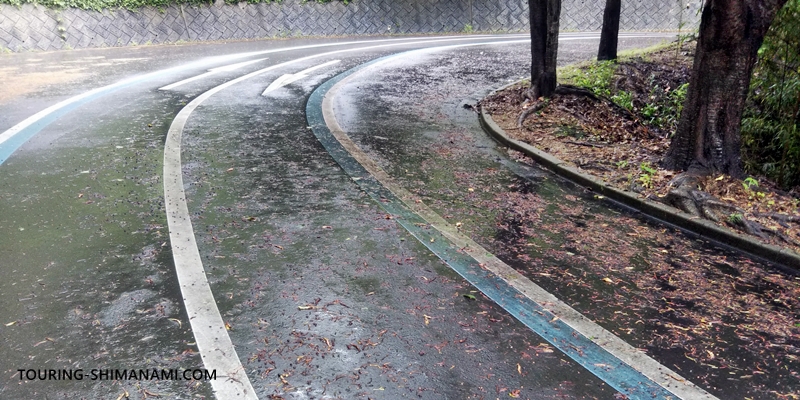
・Overspeeding on downhill curves
→ Downhill sections are where serious accidents often occur. Use your brakes and stay in your lane.
・Falls caused by braking with only one side
→ Apply brakes evenly on both sides. Using only the front brake risks flipping forward, and only the rear brake risks skidding.
・Falls caused by pedal striking the ground
→ When cornering, raise the pedal on the inside. If the inside pedal is down, it can hit the ground and cause a fall.
Above all, for safe and enjoyable cycling, embrace the “Share the Road” spirit by strictly following traffic rules and manners. Avoid excessive speed, ride single file on the left, and keep distance. To make your Shimanami Kaido ride a great memory, please review bicycle traffic rules once again.

You’ve come all this way—don’t let an injury ruin your cycling adventure. Please ride safely and take care to avoid accidents so you can fully enjoy your time on the Shimanami Kaido.
AD (Google AdSense)
Preventing saddle soreness
The number one trouble for beginners
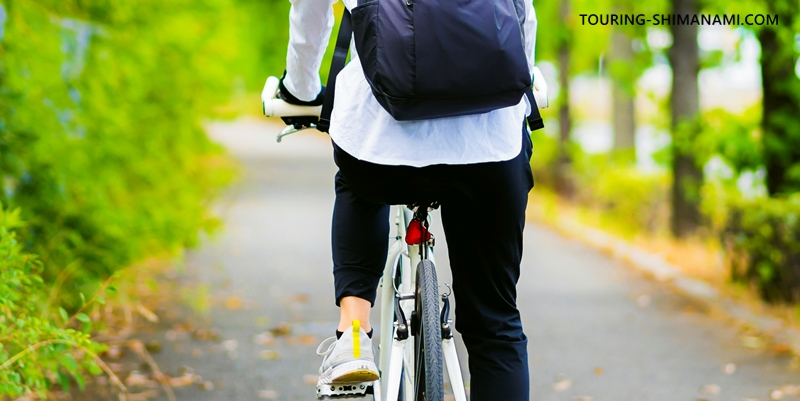
One of the biggest complaints when riding unfamiliar rental bikes on long-distance rides is soreness in the buttocks. No matter what you do, sometimes soreness is unavoidable, but it’s best to take measures to reduce the discomfort as much as possible.
Saddle shape really matters
From my experience, women and men have different pelvic structures, so the saddle shape is very important for comfortable cycling. Most rental bikes use unisex saddles, which tend to be closer to male designs. Recently, wider and shorter saddles designed for women have become available, but changing the saddle on a rental bike is generally difficult.
Tip ①: Cycling shorts
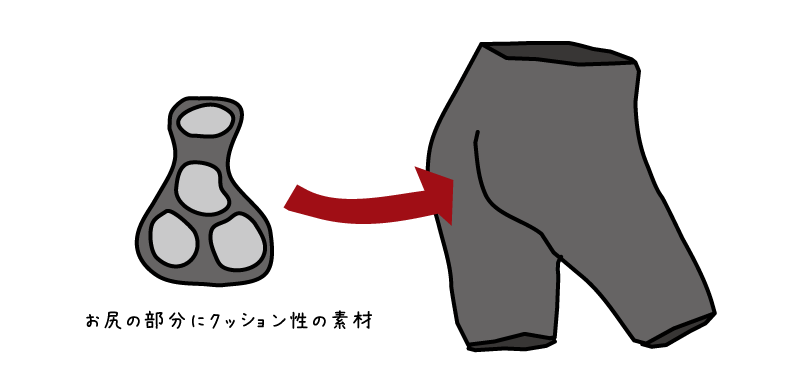
If you’re especially concerned about saddle discomfort, we recommend wearing cycling shorts with built-in padding. These shorts are commonly used by road cyclists and are considered essential for longer rides. If you’re not a fan of the tight-fitting look, no worries—you can wear them like underwear and put a skirt or regular shorts over them. You’ll still get the comfort without compromising your style!
Tip ②: Saddle pad cover
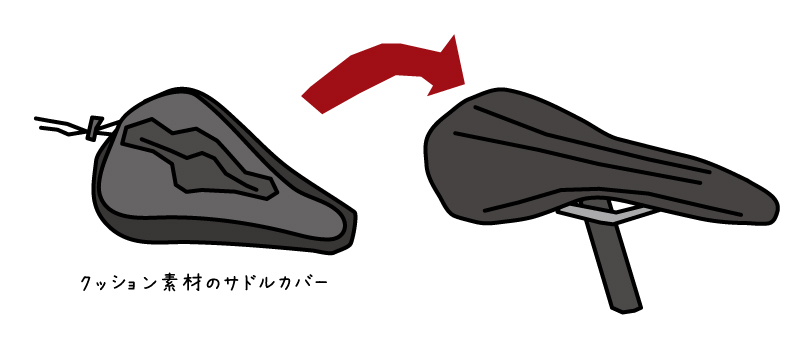
Some private rental bike services include this as a standard item or offer it as an optional add-on: a saddle pad cover that goes over your bike seat. It won’t eliminate discomfort entirely, but it can make a noticeable difference—especially on longer rides. These covers usually cost around 1,000 to 2,000 JPY and are easy to find. Many types also fit regular city bikes, so you might find it useful even after your Shimanami Kaido ride!
Also, if the saddle is set too low, it can cause buttock pain. This is because all your weight puts pressure on your seat bones. Conversely, a saddle set too high can cause knee pain. Adjusting to the right height is essential. When seated, your toes should barely touch the ground.
Reviews on Saddle SorenessI didn’t expect my butt to hurt this much. I stopped enjoying the ride halfway through.
The hostel staff wrapped a towel around the saddle for me. It didn’t stop the pain, but I appreciated it.
After last time’s lesson, I got a saddle cover. It still hurt, but much less.
This page introduced how to handle and prevent common troubles such as flat tires during bicycle trips. For comprehensive information on cycling the Shimanami Kaido, please refer to the page below. Use it to plan your cycling trip!
